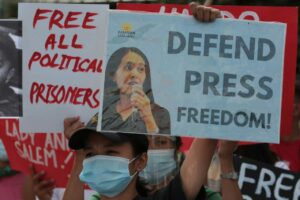Sustainable healthcare

A group of healthcare professionals recently expressed a belief that, as far as they are concerned, the coronavirus disease 2019 (COVID-19) pandemic has come to an end.
One of the officials of the Philippine College of Physicians has said the pandemic is already over because they are no longer seeing too many cases of COVID-19 on the ground.
The official added that their group was just waiting for the World Health Organization (WHO) to make an official announcement about the status of COVID-19, which has infected more than 760 million people and killed more than 6.8 million people globally.
As of the weekly epidemiological update by the WHO, more than 3.7 million new cases and more than 26,0000 deaths were reported worldwide on Feb. 20 to March 19. While these figures showed a sharp decline in cases and deaths, the WHO said there are significant regional differences, including increases in some areas.
The COVID-19 pandemic, which has overwhelmed and overburdened healthcare systems worldwide, has made a compelling case for the global community to take notice and action.
Amid the country’s continuing recovery from the socioeconomic and health impact of this pandemic, there is progressive realization on the need to strengthen the healthcare system and make the efforts sustainable.
With several countries moving on from the pandemic, there is also recognition that it is high time to shift the focus to other equally pressing health concerns.
“Six of the 10 diseases that caused the most deaths in the Philippines in 2019 were noncommunicable diseases, with ischemic heart disease and stroke occupying the top two spots,” Lotis Ramin, president of AstraZeneca and concurrent president of the PHAPCares Foundation, told a recent forum.
The other noncommunicable diseases on the top 10 list are chronic kidney disease, diabetes, hypertensive heart disease and chronic obstructive pulmonary disease, she said.
More than seven million Filipinos had been diagnosed with stage 3 chronic kidney disease or even higher in 2021; 19,000 new cases of lung cancer were diagnosed in the country in 2020; and 11 million Filipinos are suffering from asthma, Ms. Ramin said, citing statistics from global studies.
Unfortunately for the last three years, noncommunicable diseases had to be deprioritized to address the urgency of the COVID-19 pandemic. With these figures, it’s time to bring the attention back to the equally serious problem of noncommunicable diseases, which account for 68% of deaths in the Philippines.
Close to 50% of healthcare expenditure in the country is out of pocket, which is very challenging especially for those in the lower socioeconomic bracket.
Ms. Ramin stressed that addressing the huge unmet needs in healthcare in the country requires government and private sector partnership to maximize resources and innovative approaches.
An encouraging development is the inclusion of healthcare in the Marcos government’s eight-point socioeconomic agenda. The innovative biopharmaceutical industry, which has also been in the forefront of COVID-19 efforts, looks forward to building stronger partnerships with the government to support this agenda and improve healthcare access for Filipinos, Ms. Ramin said.
At the same forum, Diana Edralin, general manager of Roche and president of the Pharmaceutical and Healthcare Association of the Philippines (PHAP), said investing in healthcare should not be seen as a burden or cost, but rather as a human capital investment that drives economic growth.
With improved healthcare and a healthy population, production losses due to absenteeism and tardiness, as well as those from frailty and fatigue, are reduced, the doctor said. Children can also become smarter and stronger, and grow up to become more competent adults, she said.
Ms. Edralin presented the industry’s proposed whole-of-systems approach toward sustainable healthcare. To promote early detection, screening and prevention, the industry aims to elicit the participation of local government units through public-private partnerships (PPPs), as well as to continue partnering with patient groups in line with their patient-centric thrust.
Another area for partnership is the continued conduct of clinical trials to generate local data and provide Filipino patients with early access to treatment.
Clinical trials are carefully designed studies that establish the benefits and risks of a medical treatment or intervention. Beyond the health benefits, they translate to investments that have positive economic impact on the country.
These economic benefits include direct investments made by biopharmaceutical companies to identify and operate clinical trial sites; hire staff and contractors; recruit, retain and treat participants; and conduct clinical trial protocols and activities, including monitoring research sites.
A further area of collaboration is the continued updating of the Philippine National Formulary through a dynamic health technology assessment process that will make innovative and life-saving treatments available in public hospitals and other government facilities to lower out-of-pocket costs.
Ms. Edralin recommended three sustainable investments in healthcare that are needed today — increase public investments in health, accelerate the implementation of the Universal Health Care Act and the National Integrated Cancer Control Act, and expand the innovation mindset and public-private partnerships in health.
Teodoro B. Padilla is the executive director of the Pharmaceutical and Healthcare Association of the Philippines, which represents the biopharmaceutical medicine and vaccine industry in the country. Its members are in the forefront of research and development efforts for COVID-19 and other diseases that affect Filipinos.




